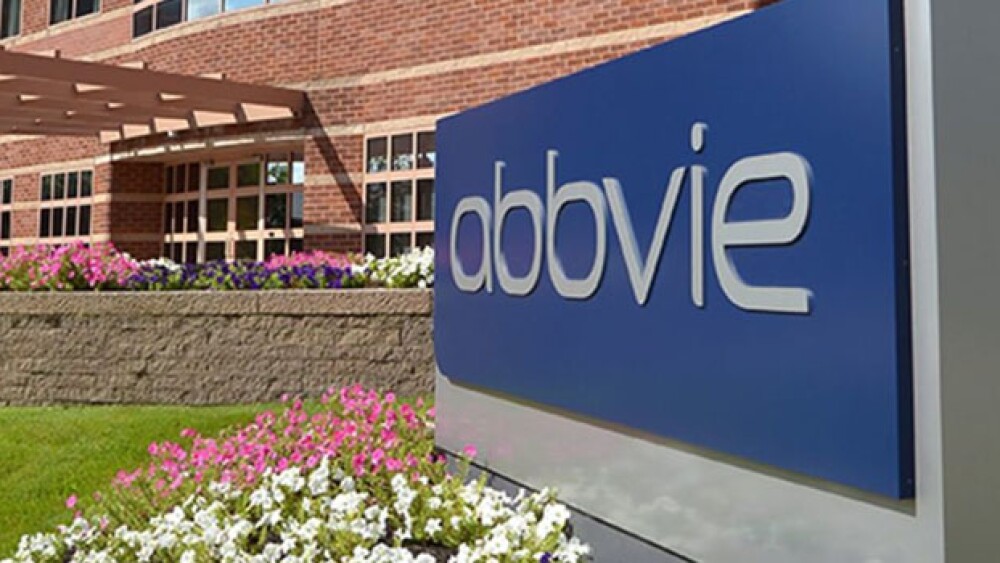The company expects to only pay a tax rate of 9 percent this year, which will free up a lot of cash.
Earlier this week, Chicago-based AbbVie announced an unexpectedly positive 2018 guidance revision. Among other things, the company expects to only pay a tax rate of 9 percent this year, which will free up a lot of cash. Now that investors and analysts have had time to digest this information, they’re evaluating what the company’s merger-and-acquisition activities might look like this year.
Tax reform legislation intended to lower the corporate tax rate from about 30 percent to around 20 percent, but AbbVie indicated that the lower rate was because of “a one-time net tax benefit related to the timing of the phase in of provisions of the new legislation on certain subsidiaries.” It expects its tax rate will slowly increase over the next five years to about 13 percent.
The company said it plans to invest about $2.5 billion in U.S. capital projects, make a one-time charitable donation of about $350 million to not-for-profit organizations in the U.S., including rebuilding efforts for Puerto Rico, and to push $750 million more into pension funding and to increase employee compensation. It is also working on a plan to grow its stock dividend and repurchase more shares.
What seemed a bit understated was an interest in mergers and acquisitions, although its chief executive officer, Richard Gonzalez, did say in a conference call with analysts and investors that it will be in the market for acquisitions that might help drive growth in the 2023 to 2025 time frame.
In a note to clients, Geoffrey Porges, an analyst with Leerink, wrote, “We expect the narrative for this stock to develop into a ‘who will it buy?’ story, similar to Gilead in 2016 and Celgene more recently.”
Celgene announced last week that it would buy Juno Therapeutics for $9 billion. Sanofi has announced it will buy Bioverativ for $11.6 billion and Ablynx for $4.8 billion. Seattle Genetics, in a much smaller deal, announced today that it is buying Cascadian Therapeutics for $614 million.
Any acquisitions AbbVie makes are likely to be in neuroscience, or early-stage immuno-oncology or solid tumors. It’s also possible, with a key readout on an early-stage Alzheimer’s drug in 2019, that it might try to bolster its Alzheimer’s pipeline.
Vamil Divan, an analyst with Credit Suisse, points out that AbbVie has quite a bit of confidence in its pipeline, but is always keeping an eye open for promising assets. “They do not have a burning platform where they need to acquire an asset,” he wrote in a note. “If there isn’t a compelling need and the company is dealing with many other things, it probably is not the best time to do mergers and acquisitions…. If they find anything in the 2019 or 2020 timeframe, even before the (neuroscience) readouts, they would not necessarily feel the need to wait.”
On the other hand, if January is any indication, 2018 will be a big year for acquisitions in the biopharma space, and reasonably priced but high-potential biotech companies with promising pipelines are going to get scooped up fast.
Or companies are going to license the most promising assets. Last week, Biogen acquired an IND-ready asset from Karyopharm Therapeutics for $10 million upfront and a potential $207 million in development and commercial milestones. The buy was for KPT-350 and other assets to treat several neurological and neurodegenerative conditions. KPT-350 inhibits XP01, which reduces inflammation and neurotoxicity while increasing neuroprotective responses. Although it has broader potential applications, the initial focus is on amyotrophic lateral sclerosis (ALS).
AbbVie isn’t saying if it has any near-term acquisitions in mind, or what kind, but many investors will be watching.





